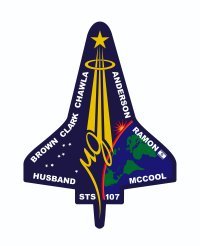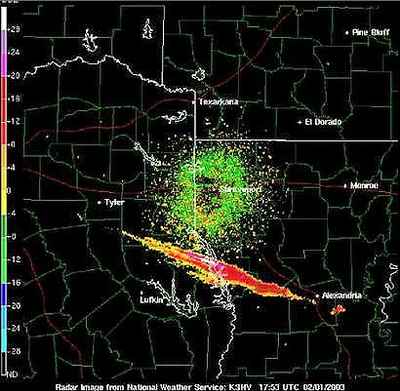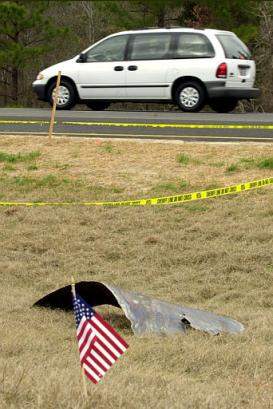Tue, Feb 25, 2003
 The Columbia Accident Investigation Board (CAIB)
Advanced Sightings Team is working to pinpoint the location of
hardware that may have separated from the Space Shuttle Columbia
early in its final path over the western United States.
The Columbia Accident Investigation Board (CAIB)
Advanced Sightings Team is working to pinpoint the location of
hardware that may have separated from the Space Shuttle Columbia
early in its final path over the western United States.
The team is bringing together data from the National Aeronautics
and Space Administration (NASA), the public, Department of Defense
(DOD), Department of Energy (DOE), the National Oceanic and
Atmospheric Administration (NOAA), the United States Geologic
Survey (USGS) and all other sources of valuable information that
become available. The collaboration of all these organizations has
been outstanding. The team is piecing together the information from
these sources to learn as much as possible about anomalous
conditions during the entry of Columbia.
Examples of information that is being brought to bear are:
- On orbit photography and analysis- DOD
- Radar searches- DOD
- Infrasonic data- DOE, NOAA
- Tracking of possible on orbit object from Columbia 1/17/03 and
analysis- DOD
- Launch Analysis- DOD
- Identification of entry shedding events- DOD
- Kirtland photo analysis- DOD

This team is analyzing video footage turned in by space flight
enthusiasts and other sources of information to document exactly
when these events occurred. The earliest shedding of Shuttle
hardware may well have been documented by videos taken near the
California coast. The team identifies anomalous events from the
video data and correlates them to the entry timeline.
 Analysts calculate the exact time and angles of
the observation by determining exactly where the videos were taken
from and by identifying planets or star fields in the background.
The team calculates trajectories to predict probabilities of where
the debris may have fallen to Earth by estimating properties of
possible debris from the video and incorporating known atmospheric
and wind data. Radar data is then retrieved and investigated to
search for specific
Analysts calculate the exact time and angles of
the observation by determining exactly where the videos were taken
from and by identifying planets or star fields in the background.
The team calculates trajectories to predict probabilities of where
the debris may have fallen to Earth by estimating properties of
possible debris from the video and incorporating known atmospheric
and wind data. Radar data is then retrieved and investigated to
search for specific
signatures. This process serves to drastically reduce the area that
must be searched.
The Advanced Sightings Team is making significant progress in
accurately characterizing possible debris events. They are in the
process of making the subsequent calculations and taking the next
steps. The most western find is still not far from Fort Worth,
Texas. Using this process and other possible means, we hope debris
discovered farther west would help to unravel the mystery of why
this tragedy occurred.
The CAIB and NASA continue to encourage all who have videos or
who identify potential Columbia hardware to contribute to the
success of this investigation by contacting us as soon as possible.
If you find hardware, you should contact local authorities. Avoid
touching it in case it is ontaminated with toxic substances.
More News
“We respectfully call on the City of Mesa to: 1. Withdraw the landing fee proposal immediately 2. Engage with the aviation community before making decisions that impact safet>[...]
High Speed Taxiway A long radius taxiway designed and provided with lighting or marking to define the path of aircraft, traveling at high speed (up to 60 knots), from the runway ce>[...]
Aero Linx: International Federation of Airworthiness (IFA) IFA uniquely combines together all those with responsibility for policies, principles and practices concerned with the co>[...]
Controller’s Expectation That VW02 Would Have Departed Sooner Led To An Inadequate Scan And Loss Of Situational Awareness Analysis: A Robinson R-44 helicopter N744AF, VW02 (V>[...]
A Few Questions AND Answers To Help You Get MORE Out of ANN! 1) I forgot my password. How do I find it? 1) Easy... click here and give us your e-mail address--we'll send it to you >[...]
 Aero-News: Quote of the Day (12.09.25)
Aero-News: Quote of the Day (12.09.25) ANN's Daily Aero-Term (12.09.25): High Speed Taxiway
ANN's Daily Aero-Term (12.09.25): High Speed Taxiway ANN's Daily Aero-Linx (12.09.25)
ANN's Daily Aero-Linx (12.09.25) NTSB Final Report: Diamond Aircraft Ind Inc DA20C1 (A1); Robinson Helicopter R44
NTSB Final Report: Diamond Aircraft Ind Inc DA20C1 (A1); Robinson Helicopter R44 ANN FAQ: Q&A 101
ANN FAQ: Q&A 101





